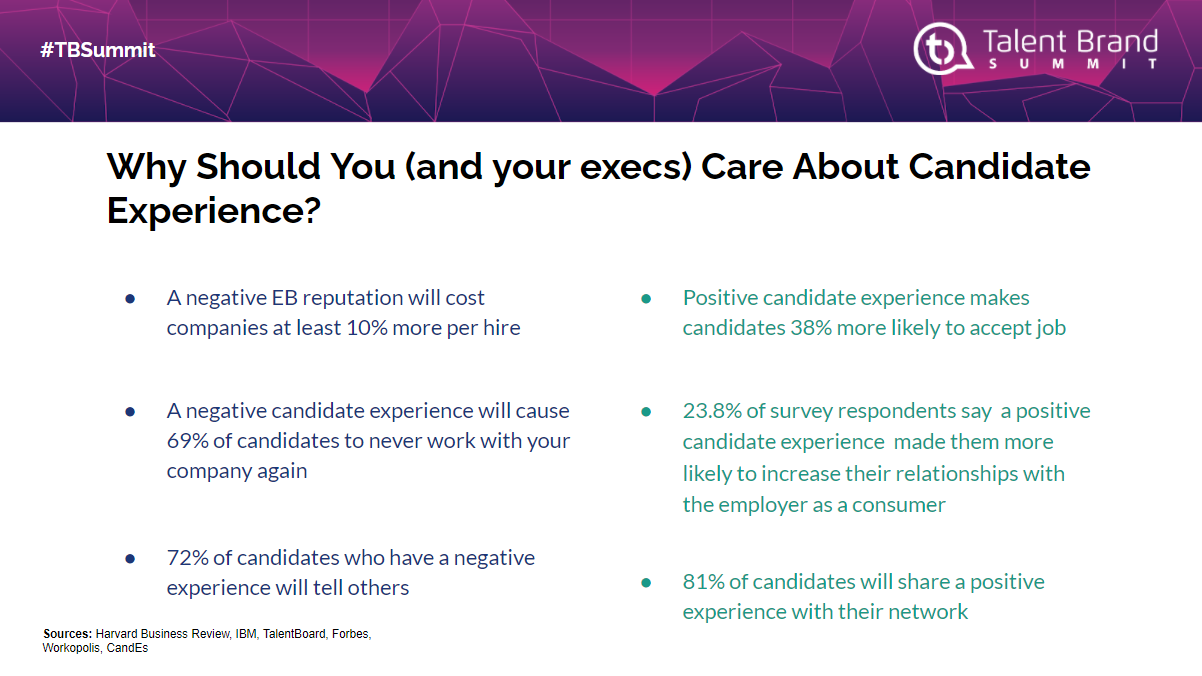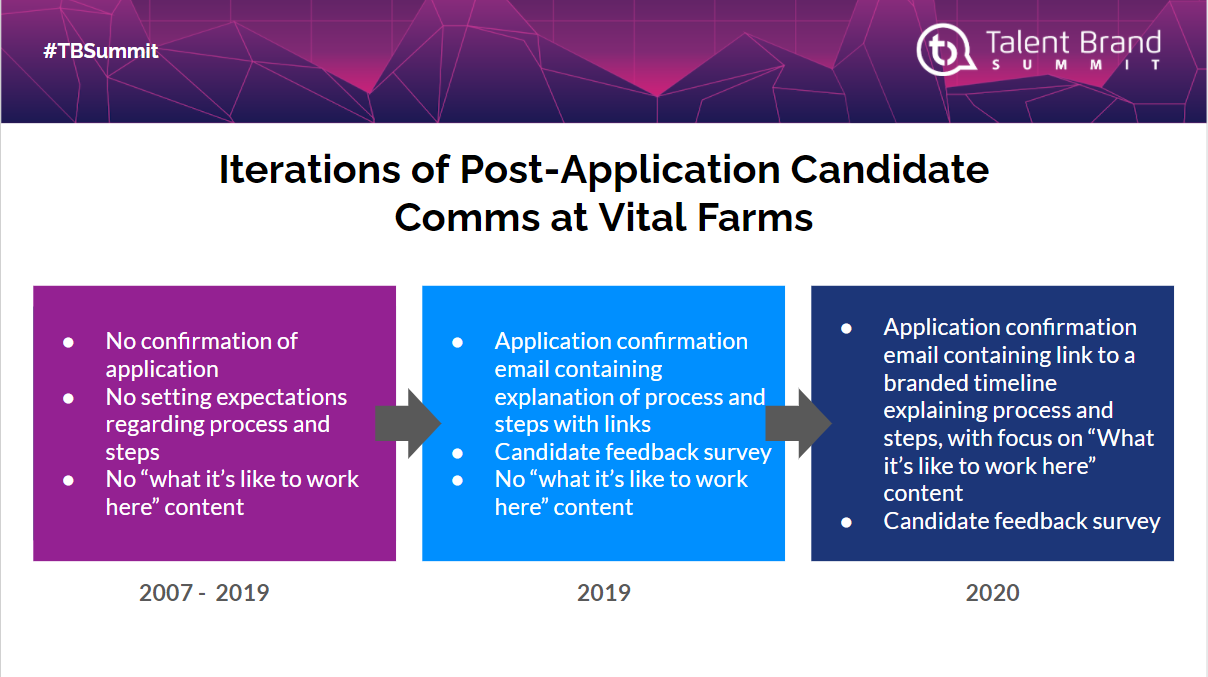Candidate Experience + Your Employer Brand – A Perfect Match
Like peas & carrots, chips & salsa, Batman & Robin, college football & tailgating – they belong together.
When thinking about talent attraction only, a candidate’s experience begins with the job search and concludes once the employee is onboarded.
But it’s what’s in between those two bookends that counts.
From job search to onboarding, there are multiple steps and various communication touch points, including online research on sites like Glassdoor, application submission through the ATS, recruiter outreach, phone, digital or in-person interviews, the offer process, and the often overlooked but critical period between offer to onboarding.
Why should companies care about the candidate experience?
This question was posed to the attendees at #TBSummit 2020 by presenter Julia Bonaventure, Senior Manager or Talent at Vital Farms. As a follow up, she asked a question from a recent LinkedIn study: “What percentage of perspective candidates will consider your employer brand before applying?”
What’s your guess? Write it down. I’ll wait.
A) 25%
B) 45%
C) 55%
D) 75%
Did you answer D? That’s the correct answer! 75% of perspective candidates consider a company’s employer brand before applying. That’s huge.
“ 75% of perspective candidates consider a company’s employer brand before applying”
That’s why companies should care about the candidate experience. Because those candidates were probably also your potential customers. Meaning, out of every 100 applicants, your company had a moment to make a positive or negative impression on 75 customers.
Let’s break this down further:
Positive effects of good candidate experience
24% of candidates more likely to increase their relationships with employer as a consumer
81% of candidates will share positive experience with their network
Negative effects of bad candidate experience
Poor employer brand reputation will cost companies at least 10% more per hire
72% of candidates will tell others about poor experience
So, how do you ensure you end up on the positive side of candidate experience?
Sources: Harvard Business Review, IBM, TalentBoard, Forbes, Workopolis, CandEs
Communication is KEY!
How recruiters interact with candidates is a critical element to their experience. Recruiters are brand ambassadors and set the tone for company culture and what candidates should expect if they are progress through the hiring process.
Common communication touch points
Pre-apply: Career site, Indeed, Glassdoor, LinkedIn
Application: Applicant tracking system (ATS)/ Candidate relationship management (CRM)
Recruiter: Phone call or email providing basic background info related company and role as well as next steps for interview process
Hiring Manager: Interview and deeper summary around what success looks like on their team/in the role they are hiring
HR: Email notifying candidate if they got the role. Personalized email or phone call with next steps related to employee onboarding and orientation
Onboarding: Key to make the new employee feel welcomed, appreciated, and ready to contribute the organizational goals while getting acclimated to the culture
MVC? (Most Value from this Content)
During the session, Julia walked us through a little game of “who would get the most value from this content?”, and the most common answer was recruiters. Recruiters are pulled in many directions and are a critical focal point when it comes to delivering a positive candidate experience.
#TBSummit attendees shared that providing toolkits to recruiters would be the biggest help to improving the candidate experience. These toolkits can include (but are not limited to):
Company swag bags
Emails with video and blog links showing what a day in the life of the company is like
Emails showing the onboarding roadmap, so candidates know what the hiring process and potential career path is like for different roles
Personalized email templates based on role that would share where to find insightful company information on the web or career site
What did we learn about candidate experience?
Trying to be aligned with the different teams involved in the candidate experience is crucial to providing the best possible candidate experience.
First, it starts with senior management and making sure the company values, mission statement, and culture are understood and practiced throughout the organization. This way employees will be great brand ambassadors for the organization in all facets.
Secondly, it’s important to work with team leaders directly involved with the hiring process to ensure there’s consistency in the candidate experience throughout the interview process so the company can try to put its best foot forward.
Finally, aligning all stakeholders – employer brand, recruiting, HR, hiring leaders – to ensure everyone is on the same page, supporting each other, and using the correct and most up-to-date resources to provide the best positive candidate experience from the ground level as possible.
About TBA Member Byron Jackson
Byron Jackson is an employer brand and recruitment marketing leader based in Miami, Florida. He studied entrepreneurship at the University of Central Florida and received an MBA in Finance from Nova Southeastern University. He started his career in finance but always had a passion for branding. He crossed over into the employer brand and recruitment marketing space in 2016 with Subway®, where he supported 9k+ Subway® franchisees nationwide.




